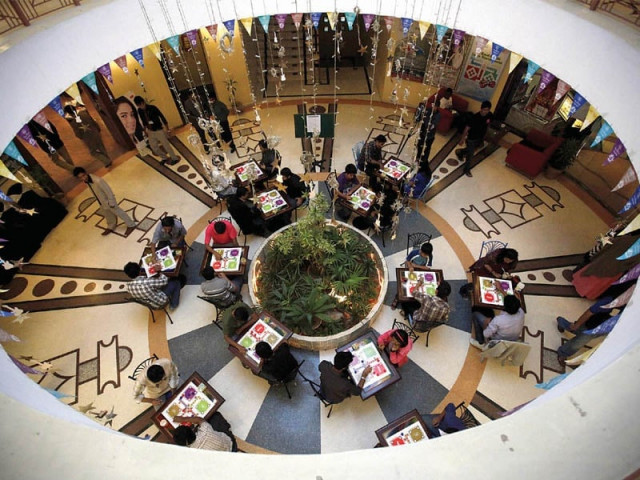Ludo tournament: From Mughal courts to our living rooms
Ludo has been played competitively at school and college levels regularly.

An owner of an event managing company, Ahmed took part in the event not just to relive his childhood memories but also to promote one of his favourite board-games to his nieces and nephews who have swerved towards video games and other modern sources of entertainment.
“Ludo is there in most of my childhood memories, every weekend of my summer and winter vacations that I spent with my cousins and my siblings has ludo in it,” said Ahmed, as he prepared to take on a college student in the semi-finals.
“It is some serious fun. It’s also commercially viable, given the turnout at the event and it’s safe to say that ludo hasn’t lost is charm yet.”
For his opponent, the 17-year-old Huzaifa Asif, ludo is more rewarding than video games, the reason why he plays it every weekend with his cousins.
“I feel extremely proud when I beat my parents in the game,” said Asif. “And that’s the amazing thing about it, everyone can play it. It’s all about luck and as well as concentration. Experience does not guarantee you a win.”
It’s all about the excitement
Asif and Ahmed were among the 42 who participated in the tournament which offered a meagre prize-money but plenty of entertainment with an air of nostalgia.
According to Muhammad Haroon, the tournament director, the success of the tournament - including corporate sponsors jumping onboard- has forced him to consider it a regular feature.
“It’s a game that transcends economic groups,” said Haroon. “Everyone has played ludo and unlike chess or scrabble, ludo has a simple concept and offers more fun. It’s been a hit ever since it arrived.”
Ludo has been played competitively at school and college levels regularly. The Beaconhouse student council in Islamabad holds an annual tournament.
This year, the fourth annual tournament was attended by over 100 students in the capital while over 150 teams from different colleges in Karachi took part in the Agha Khan University mixed doubles event that took place in April.
Similarly, many enthusiasts entertain themselves during Ramzan with local tournaments that kick off after the taraweeh prayers.
From imperial courts to regular households
Ludo is in fact it is a modern form of Chaupar, a game popularised by Akbar in the 16th century. Chaupar was a cruciform board-game played with quaternary lots in the form of long dice. The board was made of wool or cloth and the pawns made of wood.
It was the sport of the subcontinent and Akbar was so fond of it that he would use 16 of his maids in place of wooden pawns on the large marked-out areas with inlaid marble. The floor was marked red and white on the palace courtyards at Allahabad and Agra, serving as the Chaupar board.
Later on, it was published and marketed in England in 1862 on a paper board instead of cloth with colourful plastic pawns and dice.
It got popular in the European countries as ludo, while in the US it was published and marketed in 1867 as Parcheesi. Today, there seems nothing noble about ludo but its availability on the iPad and various online versions prove its popularity worldwide.
Published in The Express Tribune, December 27th, 2011.



















COMMENTS
Comments are moderated and generally will be posted if they are on-topic and not abusive.
For more information, please see our Comments FAQ